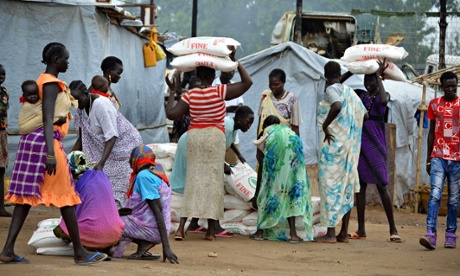AKIPRESS.COM -  The number of chronically undernourished people in the world’s poorest countries has fallen by nearly 10% over the past two decades, but one in four sub-Saharan Africans still face food shortages.
The number of chronically undernourished people in the world’s poorest countries has fallen by nearly 10% over the past two decades, but one in four sub-Saharan Africans still face food shortages.
Agricultural investments and successful government policies mean more than 200 million people are no longer extremely malnourished. That, according to a report released on Tuesday by the Food and Agriculture Organisation (FAO), has put “within reach” the millennium development goal (MDG) to halve the proportion of hungry people.
But more than 800 million people are still chronically undernourished, despite a reduction in the percentage of seriously underfed people in low-income countries from 23.4% in 1990 to 13.5% this year, the State of Food Insecurity in the World 2014 said. Regional discrepancies in eradicating hunger have resulted in 38 million additional hungry people in sub-Saharan Africa over the past 20 years, making many countries in the region likely to miss the hunger goal. Southern and western Asia are also not on track to meet the goal, the report added.
In contrast, in east and south-east Asia, and Latin America and the Caribbean, the number of hungry people has been halved, meeting the MDG. The international community is not likely to meet a separate target set at the World Food Summit in 1996 to halve the total amount of undernourished people by next year, the study said.
Governments with strong resolve to reduce hunger have been most successful, said José Graziano da Silva, the FAO’s director general. “Poor countries like Malawi did a lot with their little money and little research due to the political commitment of the government to tackle hunger and undernourishment as a priority,” he said.
Malawi has met the MDG for hunger and was lauded in the report as an example for other governments. The report also applauded hunger reduction in Brazil and Indonesia, which had linked “macroeconomic, social and agricultural policies” to ease malnutrition, as well as sustained efforts to keep food prices stable.
But conflict, natural disasters and economic problems have plagued efforts to reduce hunger in Central African Republic, Iraq, South Sudan, Syria and “in many other countries overlooked by the headlines”, said Ertharin Cousin, executive director of the World Food Programme (WFP).
Humanitarian crises have engulfed these countries, setting back years of progress in reducing hunger “in just a matter of weeks”, she said. “The biggest challenge to achieving zero hunger is the challenge of acute hunger and the demands of meeting acute hunger as the result of crisis, shocks and conflicts.”
Famine in South Sudan, which descended into civil war last December, remains “very possible” if agencies are not able to reach children in places where fighting is most severe, said Cousin. Funding shortfalls also pose problems for agencies working to ease hunger in humanitarian crises, Cousin said, adding that the WFP is spending $34m per week to feed Syrian refugees, which is difficult to sustain.
Chronic undernourishment is defined by the FAO as the “inability to acquire enough food, defined as a level of food intake insufficient to meet dietary energy requirements.” John McIntire, associate vice-president of the International Fund for Agricultural Development, said the world’s poor people need “access to markets and finance, land tenure security, knowledge and technology, policies that favour small farmers and make it easier for them to work and to grow”.
